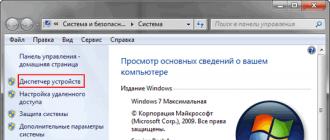The level of development of modern technologies in the world today is so high that today it is rare to meet a person who does not use a smartphone or computer, the Internet. In this regard, the development of viral software also flourishes, which steals data, interferes with the operation of the computer, infects files, which makes them unsuitable for use.
At the same time, the most unpleasant thing is that almost daily new viruses are created, both simple and complex and dangerous. Therefore, it is necessary to carry out preventive checks for the viruses of those devices that use the Internet connection, as well as connection using Bluetooth technology.
To do this, you can install on your smartphone an antivirus, a program that will catch, and block the work of all suspicious applications. It's better if it's a paid licensed version, then your phone will be well protected, most of these applications offer the use of other additional features that help protect, as well as speed up the phone.
Another option that can be used is to test the phone for viruses using a computer. Such scans can be carried out both as a primary and as an additional scan. In the case, for example, if the phone is insufficient random access memory and the system does not cope with the load, it freezes and slows down.
To do this, you need installed on your computer any antivirus and USB cable to connect it to your computer. Then follow the instructions:
- Synchronize devices if their systems require it. After the devices have been synchronized, the device is recognized by the computer and ready to use, you can see your phone in the "My Computer" folder in the "Removable Storage" section.
- Select your device and right click on the name. From the drop-down list, select the item "Scan with ...", "Check with ...", etc. The construction of the phrase depends on the antivirus program that is installed on your computer. In place of the three-point word in the phrases will be the name of the program, so you will not be mistaken. A quick scan will begin.
- At the end of the test, if everything is clean, the program will issue a notification, if not, you will see a list of infected files and the proposed actions - "Cure", "Delete" and so on. Select the desired action. If the file is "incurable" and contains a threat to the system, it is recommended that you delete it. Then you can disconnect the phone and use it as usual.
The development of mobile devices has led to the emergence of viruses that affect operating systems designed specifically for mobile devices. In the risk zone are the phones that are connected to the mobile Internet, and from which (and to which) the files are transmitted via Bluetooth or MMS.
To always be aware of the current situation, as an example, try to check the phone for viruses through the computer.
Quick navigation for article
We address in the service center
If you have any suspicions about the presence of viruses in your phone, then the most correct solution is to contact the service center in order for the phone to be checked by professionals.
To check for viruses, there are special programs. Of course, it's best to purchase licensed versions.
Antivirus check
You can check the phone for viruses through your computer, using the anti-virus program installed on it. This method is especially suitable for phones that lack a full-fledged operating system.
To scan for viruses, connect the phone to the computer and, if necessary, synchronize the work of the phone and the computer with a special program. The system needs to be given time to recognize the device.
- Now, in the "My Computer" section, you need to find the "Removable Storage" tab in which you should see your phone;
- Click on "Check Antivirus" to start scanning the memory card;
- After the scan is completed, the system will list the files that may be in danger;
- If there are any, just press "Disinfect all" and after completing the check and treatment, disconnect the phone from the computer by safely removing the USB device.
After verification, you can return standard settings your phone (using the software that comes with your phone or by pressing a special key combination). In this case, all information from the phone will be lost, but the operating system will return to the factory settings.
In the future, all important information from the phone is better to copy and save, for example, on a computer. Antivirus programs not always keep up with new viruses and you can lose the necessary files.
Using a computer, you can only scan the memory card for viruses (or the phone's memory in certain models, but not the system partition of the phone's operating system), and the virus can be in the device itself (in the system partition). In this case, you can not do without the help of specialists.
Share this article with friends in soc. networks:Infection when visiting sites from mobile devices
Some sites on the Internet are hacked by intruders, aimed at users of mobile devices. Having visited such a site from a computer, you will end up on an innocuous Internet resource, but when you go to it from a smartphone, you will be secretly redirected to the site with an unpleasant "surprise". Using hacked sites, attackers can distribute various malicious programs, the most "popular" of which are various modifications. Loss of the victim depends on the Trojan of which family will be embedded in your mobile device, ie, from its harmful charge. Details about this phenomenon can be found in our news.
Attention to users of mobile devices!
Install the Dr.Web anti-virus for Android with the component on your mobile device. URL Filter. Cloud filter will limit access to non-recommended and potentially dangerous sites in several categories - this is especially true for protecting your children from unwanted Internet content.
URL Filter is present only in the fully functional version of Dr.Web for Android (it is not available in Dr.Web for Android Light). For the customers of Dr.Web Security Space and Dr.Web Anti-virus, using Dr.Web for Android - is free.
Attention to users of PCs and laptops!
Install Dr.Web Link Checker
These are free extensions for checking Internet pages and files downloaded from the Internet. Install the extension to your browser and surf the World Wide Web, without fear of a virus attack!
How can I scan a file or several files with Dr.Web Anti-Virus online?
- To check 1 file: click on the "Browse .." button and select the file that causes suspicion. Click the "Check" button to start scanning.
- Maximum size file - 10 MB.
- To check several files: put the files in the archive (format WinZip, WinRar or ARJ) and download this archive by clicking on the "Browse." Button and then on the "Check" button. The verification protocol will include a report for each file in the archive.
IMPORTANT! The Dr.Web anti-virus scanner will help you determine if the file (s) you provided for the scan are infected with, but will not respond to the question whether your computer is infected. For a complete check hard disks and system memory use our free CureIt! .
You can also check local Area Networks centrally managed network utility Dr.Web CureNet!
Send a suspicious file
The development of the mobile device market inevitably led to the fact that hackers began to create malicious virus programs that hit operating systems such as Android, Windows Mobile, Symbian. If you are a user mobile Internet, receive and transfer files via Bluetooth or via MMS, your phone is already at risk of infection by malware. Therefore, it is very useful for you to know how to check your phone for viruses. Consider several ways that you choose the most suitable for yourself.
Method 1. Trust the phone to scan for viruses to professionals
Make sure that one of the above operating systems is installed on your phone. Contact a service center that serves your mobile device model, where you will be given a qualified consultation and will conduct a primary diagnosis of the device for attacks. Depending on what type of threat is detected (mobile or computer virus), the type of software that your phone is supposed to protect will also depend.
Method 2. How to check your phone for viruses: Spy Monitor Pro
In a specialized store, buy Spy Monitor Pro (of course, a licensed version of this software), install the program on the phone using the installation wizard. Then start the scanning process (it is better to select the background mode for this - so you can continue to use the mobile for your needs). When scanning is complete, click on "Delete viruses".
Method 3. How to check the phone for viruses using mobile antivirus
Download from the official site mobile version Kaspersky Anti-Virus, indicating the platform on which your mobile device is running. This version antivirus trial and will only function for a week. For full and safe operation of the phone, it is recommended to purchase a mobile antivirus in full version.
Method 4: How to check your phone for viruses through your computer
If your mobile phone there is no full-fledged operating system, then you can check for the presence of viruses in it, using the antivirus that is installed on your computer or laptop. To do this, you need to connect your phone to the computer via a DATA cable, which, as a rule, is included with the new mobile phone. If necessary, synchronize the work of your PC and your phone with a special program. Once the system detects a new device, restart the computer to allow the new connection to take effect.
Now, to check the phone for viruses, go to the folder called "My Computer" and in the "Removable Storage" section, double-click on the label with the name of your mobile phone. Then click on the "Check with antivirus" link. After the scan is completed, you will see a list of files containing possible threats. Select "Treat All". At the end of the process, safely disconnect the mobile phone as a removable device from your computer.
After "healing" your phone, return the standard settings by reinstalling the files attached to the factory software mobile phone models. In the future, remember that important data and information should be copied. Since the ingenuity of hackers knows no bounds, malware programs are updated much more often than antivirus programs. And the protection of viruses is more reliable.
So, we tried to answer the question, how to check the phone for viruses. Now you need to periodically check and clean the phone, remove the "garbage", unnecessary toys, etc. Preventing the appearance of viruses, like our health, is always better and easier than treatment.
And if it seems to you that the "cure" with computer antivirus is only enough for a short time, then only the memory card is cleared, and in the very same device the enemy "hides". To restore the normal operation of a mobile phone, it is better to contact a special service center that has a license.
After all, work safety on a smartphone and tablet is very important. In this article, let's talk about whether you need an antivirus for Android. Let's see how to check the phone for viruses and what antiviruses will make it possible to secure your mobile device from Internet threats.
To test android-smartphone for viruses download mobile antivirus
Although mobile operating systems are more resistant to infection than computers, installing additional protection and regular checking for viruses to the smartphone will not do much harm.
For Android, effective antivirus is considered Doctor Web. The treatment utility is available for Android phones, tablets and smartphones. There is both a free and paid version of protection. Antivirus Doctor Web offers basic functions that will secure the phone. Among them:
- protection from malicious software (viruses)
- anti-Theft function (anti-theft protection)
- sd card check and Android viruses
- scanning the phone's internal memory
How to check your phone for viruses through your computer
Install "Doctor Web" can be not only on the mobile phone, but also on the computer. Both options are good separately, but for a comprehensive test we would recommend downloading.
The program Dr Web Cureit will check the phone for viruses via a computer. The desktop version of the antivirus includes the latest updates of the virus databases. The utility is free, registration is not needed, the installation of keys is not required. This is the great advantage of Cureit in comparison with other antiviruses.
To scan the phone for viruses through the computer, you need to perform the following actions:
- Connect the phone's memory card to the computer
- Run the anti-virus Dr Web Cureit on your PC
- Specify the phone's memory card in the list of drives for scanning
- Start the search
- Remove found threats and viruses
Unfortunately, you will not be able to specify this scan internal memory phone for verification. Only mobile antivirus installed on the mobile device will cope with this task.
Download one of the three best mobile antivirus software:
Do I need an antivirus on Android: the pros and cons
The popularity of devices on Android does not stop growing. This mobile operating system has gained a lot of fans thanks to openness. The flexibility of Android is a clear plus of the operating system.
But not everything is as rosy as it seems at first glance. The freedom of action, given to users Android devices, leads to bad consequences. If you do not monitor the safety of your phone, you can bring a lot of troubles. By the way, in 2017, more than 50 viruses were found on Android. Increasingly, Trojans are emerging for phones and smartphones. At the same time, demand for tablets and smartphones is growing rapidly, provoking the interest of virus writers - developers of malicious software.
There are news of problems with viruses on Google Play Market. For example, the DroidDream virus, created specifically for Android, made me think about the safety of mobile users around the world. The virus was published on the Google Play page, and users were sure of the "cleanliness" of the downloaded file. As a result, the virus penetrated thousands of mobile devices.
Although Google has removed the applications infected with the DroidDream virus, the question arises: why not scan the files for malware before they are submitted for general use?
However, some developers claim that all antiviruses are terrible and if you have an antivirus installed on your phone, you need to remove it immediately. Argumented by the fact that anti-virus software slows down the smartphone, especially if there is not enough RAM. In addition, an antivirus running in the background can cause conflicts with other applications.
It is also alleged that mobile antiviruses very intrusive. They try to prevent actions malware before they penetrate the system, so they analyze the work in other applications, follow the user's actions and penetrate into the depths of the Android kernel.
There is some truth in that hackers can use not only vulnerabilities in programs and operating systems, but also in the antivirus itself.
However, this does not mean that you can not put an antivirus on a smartphone. In most cases, you improve the security of your phone due to some performance degradation. With the help of antiviruses, you can check Android for viruses. However, the installation of the anti-virus does not completely protect against the virus attack.
If you installed a protection application on your device and noticed that the phone behaves strangely or you do not like the speed drop, you can remove the antivirus.
To protect yourself from viruses, follow the rules of safe behavior on the Internet. This chapter tells about the basic fundamentals of Internet security, illustrates the most frequent errors of users. So, a small educational program to protect against android-devaysa viruses.
Download apps only from trusted sources
Bypassing suspicious applications downloaded from the Internet. The incident with DroidDream tells us that even on official websites you can "pick up" malicious software. In this case, users suspected the catch: malicious applications, as it turned out, had an Android logo, different from the official one.
Be careful, even when you go to a "proven site" like 4pda or Trashbox. Before you upload anything to your device, check the file rating, read the comments and see who the author of the application is. On many sites, forums and trackers there is a built-in anti-virus scan - a relative guarantee that the infected apk-file will not leak to the phone. However, not all sites should be trusted in this regard: the antivirus still "complains" after downloading them.
This item is mandatory not only for smartphones with Android, but also for iOS and Windows Phone.
Regularly install security updates on your mobile phone
In its updates, Google every time improves the Android OS, patching security holes. After the aforementioned commotion with the DroidDream virus targeted at Android vulnerabilities, Google fixed some weaknesses of the mobile OS and offered a security update. Therefore, you should not postpone the phone update until better times.
Stop using obsolete applications and phones - they are not safe. Always install latest updates OS and mobile applications. it the best way To keep the phone safe at a high level, it is more effective and easier than any anti-virus protection.
Do not view sensitive information on your phone via public Wi-Fi.
Access to wireless internet can be obtained at any cafe. But this accessibility makes Wi-Fi very dangerous: it increases the risk of virus downloads on Android, if there is no good protection on the mobile phone. Typically, in public places, the Internet connection is not password-protected.
Think carefully before using public Wi-Fi for serious purposes, since simple access facilitates rapid hacking.
Do not store the most valuable data on your phone
Confidential information can easily fall into the hands of hackers and other intruders as a result of a phishing attack or theft of the phone. Remove information that is compromising you from the memory of the mobile device, store passwords and other important data in more secure locations.
Take Seriously to Passwords
The password is direct access to all your information, so do not underestimate its importance. For example, recently the poker forum 2 + 2 fell victim to hackers who stole passwords, emails and all personal information of users. The forum immediately announced the incident and advised everyone to immediately change their current passwords.
Ideally, for each of your accounts, there must be a unique and complex password. It should not consist of a user name, date of birth. Use a combination of letters (small and capital letters), numbers and signs. We recommend changing the password periodically.
It would be nice to keep all your passwords in your head, but if nature does not reward you with good memory, store it in specialized applications. A good example is the KeePass password manager.
The last point is important for everyone. But the owners of the Androyd OS should heed the advice carefully, as they may stumble upon some problems due to malicious software aimed at the weaknesses of the Android OS.
As already mentioned, full and regular testing of the phone for viruses will be very appropriate.
You can find in our catalog.
Conclusion. The Internet is teeming with viruses, and each of them wants to get your data. We recommend that you install the antivirus for the phone and immediately check for viruses. If you have not yet picked up the virus on Android, your security is on your own conscience.
Checking your phone for viruses - like personal hygiene - is a must. Of course, this will not protect the Android OS from viruses by 100%, but if you follow our advice, reduce the risk of infection to a minimum.





